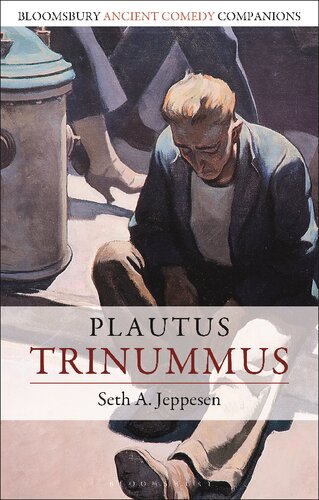Product desciption
Plautus Trinummus Seth A Jeppesen by Seth A. Jeppesen 9781350126763, 9781350126770, 9781350126800, 1350126764, 1350126772, 1350126802 instant download after payment.
In this first introduction to Plautus’ Trinummus, students and non-specialists alike are guided through the themes, context, and enduring humor of this Roman comedy. The play portrays the story of an elaborate game of keep-away involving a hidden treasure, a hot-blooded spendthrift youth, his pious sister, her would-be fiancee, a con-artist, and the most unlikely of comic schemers—a group of overly pious old men.
The conflict of the plot focuses on whether a pair of old men can help their absent friend Charmides by getting a dowry to his daughter without Charmides’ wastrel son Lesbonicus first spending the money on the usual comic debauchery. The money is taken from a treasure hidden by Charmides when he left and a sycophant is hired to pretend to bring letters from Charmides along with the cash for the dowry. Comic confusion ensues when Charmides returns from abroad just in time to intercept the con-artist and overturn the scheming of his friends.
Long neglected, Trinummus is one of many Plautine plays that is experiencing a resurgence. This volume elucidates the humor of the play, which is largely based on parody and clever inversions of typical characters and situations from Roman comedy. This discussion is accompanied by an examination of the religious, social, and historical context of the play, as well as its modern reception. The genuine humor of Trinummus has something to say to modern readers, as it showcases how parody can skewer those engaged in pompous moral posturing and presents readers with a playwright who astutely views issues of imperialism and moral justification through a comic lens.
Plautus’ Trinummus brings to the stage a story of buried treasure, deception, an unlikely betrothal, and a surprise homecoming from a perilous voyage, just in the nick of time. And yet, for all this potential, scholars and critics over the years have repeatedly panned Trinummus as the least representative sample of Plautus’ style and too boring for popular enjoyment. However, as is the case with many so-called delinquents, I maintain that Trinummus is just misunderstood. In this volume, I set out to provide the extra context and analysis necessary for readers to appreciate just how clever, and humorous, Trinummus really is. Each chapter tackles one or two important questions for the study of Roman comedy generally, followed by analysis and close readings from Trinummus that explore these questions in more detail. Topics include stock characters and typical plots, adaptation from Greek originals, the social and historical context for Plautine drama, theater at religious festivals, moralizing in Roman comedy, and the reception of Trinummus over the years. Along the way, we will make frequent stops to imagine the vibrancy of the play in performance, and hopefully get a few laughs in too. In addition to old-fashioned slapstick and fanciful wordplay, much of the laughter in Trinummus wells up from the deep waters of anxiety, deprivation, and subjugation shared between the performers and many of the everyday Romans in the audience. Laughter relieves and critiques, but also flashes glimpses of how life could be different—a message that still resonates today.


